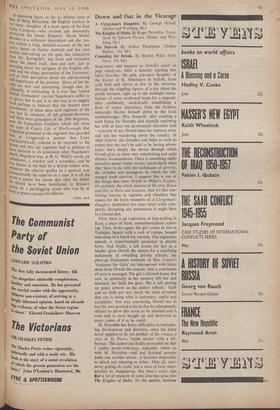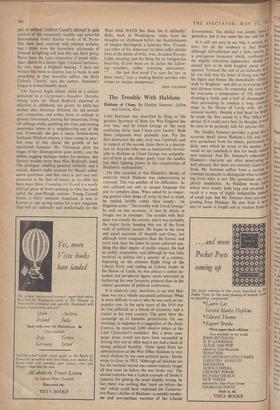Down and Out in the Vicarage
A Clergyman's Daughter. By George Orwell, (Secker and Warburg, 18s.)
SOMETHING odd happens to Orwell's novel on page ninety-six. After a leisurely opening that takes Dorothy, the pale, put-upon daughter of the Rector of St. Athelstan's in Suffolk, from cold bath and chores at five in the morning, through the crippling rigours of a day about the parish business, right up to the midnight manu- facture of some cardboard boots for a pageant; after confidently, sardonically establishing a flock of minor characters, from the feckless, autocratic Rector himself down to the local scandalmonger, Mrs. Semprill; after creating a solid frame for Dorothy and clumsily endowing her with at least one pronounced character trait —a horror of sex; Orwell takes her memory away and sets her wandering about the country. In what follows, she dwindles and fades to such an extent that she can't be said to be having adven- tures; she's simply the device through which Orwell gives us three very entertaining and quite distinct documentaries. There is something oddly attractive about `inside stories,' particularly when they have to do with the techniques of poverty, the swindles and stratagems by which the sub- merged tenth survives. I suppose this is one of the things that drew Orwell to Miller's Tropics; it's certainly the whole interest of his own Down and Out in Paris and London. And it's this con- tinuing interest in vagrants and chisellers that makes for the lively moments of A Clergyman's Daughter (published two years later) while com- pletely disrupting any pretensions it might have to a formal plot.
First, there is an experience of hop-picking in Kent, a piece of fresh, unsentimentalised report- ing. Then, broke again, the girl comes to rest in Trafalgar Square with a ruck of tramps, heaped nine-deep on a bench for warmth. This nightmare episode is experimentally presented in playlet form. And finally, a job found for her as a teacher gives Orwell the chance for a scarifying indictment of swindling private schools; the piled-up Dickensian torments of Mrs. Creevy's 'Academy for Girls' are interspersed with intru- sions from Orwell the essayist. And a conclusion of sorts is managed. The girl is allowed home, but now, as arbitrarily as her memory left her and returned, her faith has gone. She is left pasting up paper armour as the author reflects : 'faith and no faith are very much the same provided that one is doing what is customary, useful and acceptable.' Not very convincing. Orwell was in fact his own severest critic in that he subsequently refused to allow this novel to be reissued and is even said to have bought up and destroyed as many copies of it as he could.
M. Peyrefitte has fewer difficulties in maintain- ing development and direction, since his latest novel appears to be yet another of his romans a clefs de St. Pierre, 'inside stories' with a dif- ference. This author has finally persuaded me that I loathe' novels-with-keys, especially when—as with M. Peyrefitte—real and fictional persons jostle one another about : it becomes impossible to attach any meaning to either. After all, one's never getting the truth, just a mass of facts mam- mocked by imagination. But there's every sign that a lot of research of some kind has gone into The Knights of Malta. It's the patient, intricate tale of wicked Cardinal Canali's attempt to gain control of this immensely wealthy and powerful international Order. Earlier works of M. Peyre- fitte have been received with jubilant acclaim, but 1 think even the staunchest aficionado of Vatican in-fighting will find this one hard going. Never have the fades. sinuosities of papal diplo- macy shown in a poorer light; Cardinal Spellman, for one, takes a frightful beating. 'I have not written this book to destroy, but to build, to add something to that beautiful edifice, the Holy Catholic Church,' says the author. Someone's tongue is in their beatific cheek.
The Starved might almost stand as a sinister postscript to A Clergyman's Daughter, Dorothy twenty years on. Maud Radford, deprived of affection in childhood, sits grimly by while her mother dies, dismisses Mildred, the old servant and companion, and settles down to solitude in gloomy Greystones, nursing her obsessions, living off cabbage-stalks, snubbing the vicar, and writing passionate letters to a neighbouring son of the soil. Eventually she gets a meek, broken-down husband; Mildred returns; a niece comes to stay: but none of this checks the growth of her spinsterish fantasies. Mr. Thompson plots the stages of her disintegration quite subtly; and the stilted, nagging dialogue makes for eeriness. But fantasy invades more than Miss Radford's mind. The prologue, retailing parental infidelity and a suicide, doesn't really account for Maud's subse- quent queerness, and that niece is pert and self- possessed in the face of lunacy as no child has been since Alice. Crusading for Kronk is a neatly satirical piece of book-spinning in what has been called the post-Waugh manner. Young Cornell Grant, a fairly innocent American, is sent to Europe to sign up big names for a new magazine 'that will do culturally and intellectually for the West what NATO has done for it militarily.' Bella, back in Washington, melts from his thoughts on shipboard before the blandishments of Imogen Barrington, a latterday Mrs. Viveash, and other of his American loyalties suffer similar fates at the hands of witty, wise, decadent Europe. Light, amusing, just the thing for an Imogen-less boat-trip, Kronk bears on its jacket the follow- ing eccentric, rather sickening enticement:
". . . the best first novel I've seen for two or three years," says a leading British novelist who wishes to remain anonymous.'
JOHN COLEMAN





































 Previous page
Previous page